Ford Puma vs Maserati Ghibli – Differences & prices compared
Compare performance, boot space, consumption and price in one view.
Find out now: which car is the better choice for you – Ford Puma or Maserati Ghibli?
The Ford Puma (SUV) comes with a Petrol MHEV or Electric engine and Manuel or Automatic transmission. In comparison, the Maserati Ghibli (Sedan) features a Petrol MHEV or Petrol engine with Automatic transmission.
When it comes to boot capacity, the Ford Puma offers 523 L, while the Maserati Ghibli provides 500 L – depending on how much space you need. If you’re looking for more power, decide whether the 168 HP of the Ford Puma or the 430 HP of the Maserati Ghibli suits your needs better.
In terms of consumption, the values are 13.10 kWh5.40 L per 100 km for the Ford Puma, and 8.60 L for the Maserati Ghibli.
Price-wise, the Ford Puma starts at 24800 £, while the Maserati Ghibli is available from 88800 £. Compare all the details and find out which model fits your lifestyle best!
Ford Puma
The Ford Puma presents itself as a stylish compact SUV with a distinctive design that combines practicality with a dynamic driving experience. Its sleek lines and sporty aesthetics make it stand out on the road, while the interior offers a comfortable and tech-savvy environment. With an emphasis on efficiency and a smooth drive, the Ford Puma is well-suited for both urban commutes and countryside adventures.
details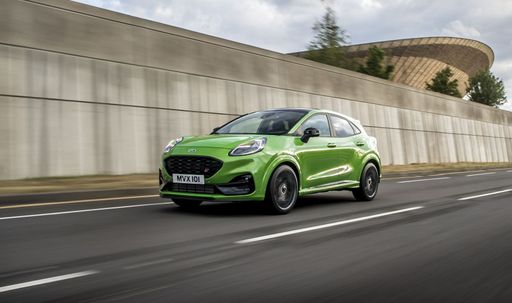 @ puma.fordpresskits.com
@ puma.fordpresskits.com
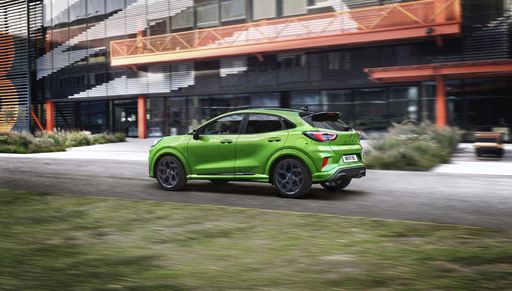 @ puma.fordpresskits.com
@ puma.fordpresskits.com
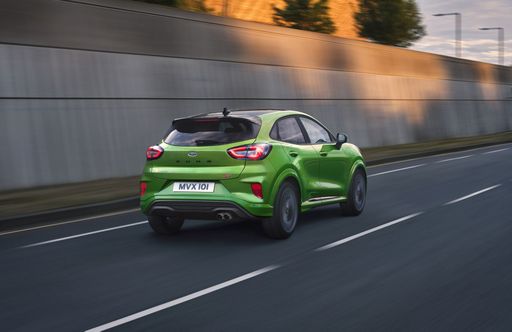 @ puma.fordpresskits.com
@ puma.fordpresskits.com
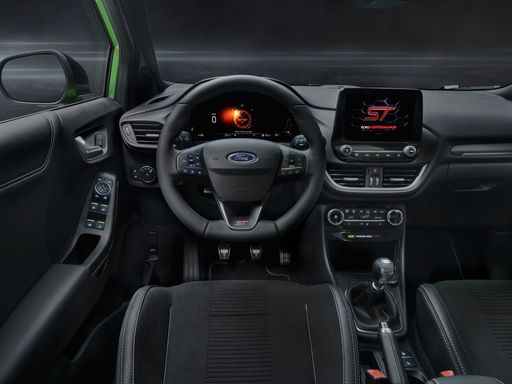 @ puma.fordpresskits.com
@ puma.fordpresskits.com
Maserati Ghibli
The Maserati Ghibli embodies the perfect blend of elegant design and athletic performance, capturing the essence of Italian luxury. Inside, the cabin boasts a combination of premium materials and advanced technology, ensuring a sophisticated driving experience. Its dynamic handling and powerful engine deliver an exhilarating ride, making it a standout choice in the luxury sedan class.
details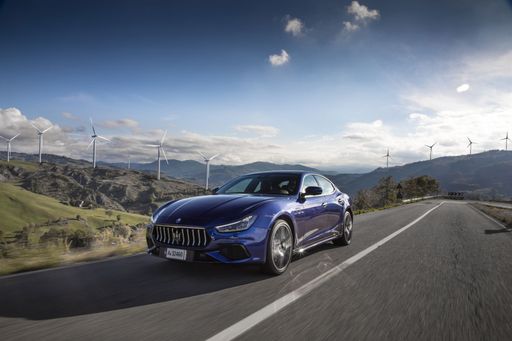 @ media.maserati.com
@ media.maserati.com
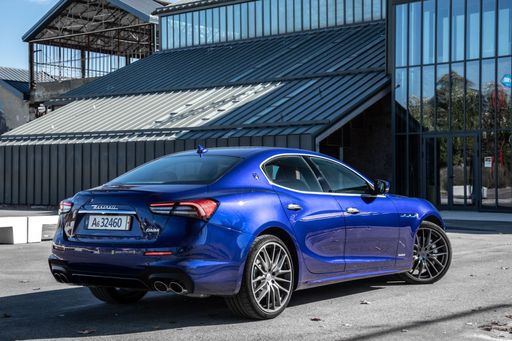 @ media.maserati.com
@ media.maserati.com
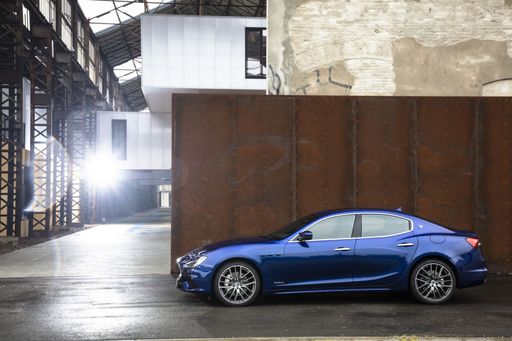 @ media.maserati.com
@ media.maserati.com
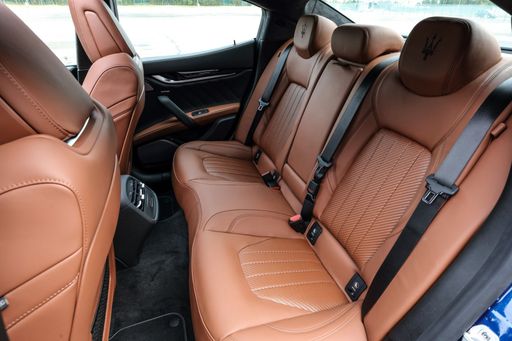 @ media.maserati.com
@ media.maserati.com

|

|
|
|
|
Costs and Consumption |
|
|---|---|
|
Price
24800 - 36300 £
|
Price
88800 - 122600 £
|
|
Consumption L/100km
5.4 - 6 L
|
Consumption L/100km
8.6 - 11.1 L
|
|
Consumption kWh/100km
13.1 - 13.7 kWh
|
Consumption kWh/100km
-
|
|
Electric Range
364 - 376 km
|
Electric Range
-
|
|
Battery Capacity
43 kWh
|
Battery Capacity
-
|
|
co2
0 - 136 g/km
|
co2
194 - 251 g/km
|
|
Fuel tank capacity
42 L
|
Fuel tank capacity
80 L
|
Dimensions and Body |
|
|---|---|
|
Body Type
SUV
|
Body Type
Sedan
|
|
Seats
5
|
Seats
5
|
|
Doors
5
|
Doors
4
|
|
Curb weight
1316 - 1563 kg
|
Curb weight
1953 - 2010 kg
|
|
Trunk capacity
456 - 523 L
|
Trunk capacity
500 L
|
|
Length
4186 - 4226 mm
|
Length
4971 mm
|
|
Width
1805 mm
|
Width
1945 mm
|
|
Height
1550 - 1555 mm
|
Height
1461 mm
|
|
Payload
367 - 469 kg
|
Payload
520 - 577 kg
|
Engine and Performance |
|
|---|---|
|
Engine Type
Petrol MHEV, Electric
|
Engine Type
Petrol MHEV, Petrol
|
|
Transmission
Manuel, Automatic
|
Transmission
Automatic
|
|
Transmission Detail
Manual Gearbox, Dual-Clutch Automatic, Reduction Gearbox
|
Transmission Detail
Automatic Gearbox
|
|
Drive Type
Front-Wheel Drive
|
Drive Type
Rear-Wheel Drive, All-Wheel Drive
|
|
Power HP
125 - 168 HP
|
Power HP
330 - 430 HP
|
|
Acceleration 0-100km/h
7.4 - 9.8 s
|
Acceleration 0-100km/h
4.7 - 5.7 s
|
|
Max Speed
160 - 210 km/h
|
Max Speed
255 - 286 km/h
|
|
Torque
170 - 290 Nm
|
Torque
450 - 580 Nm
|
|
Number of Cylinders
3
|
Number of Cylinders
4 - 6
|
|
Power kW
92 - 124 kW
|
Power kW
243 - 316 kW
|
|
Engine capacity
999 cm3
|
Engine capacity
1998 - 2979 cm3
|
General |
|
|---|---|
|
Model Year
2024 - 2025
|
Model Year
2023
|
|
CO2 Efficiency Class
D, E, A
|
CO2 Efficiency Class
G
|
|
Brand
Ford
|
Brand
Maserati
|
Ford Puma
A Glimpse into the Ford Puma: Fusing Style with Innovation
The Ford Puma stands as a testament to modern engineering fused with style. This compact SUV is not just about aesthetics but brings to the table an array of technical innovations, topped with the reliability and performance Ford is known for. Let's delve into the technical specifics and innovative features that make the Ford Puma a stellar choice for any car enthusiast.
Powertrains and Performance
The Ford Puma is offered with a range of powertrains designed to deliver optimal performance whilst minimising fuel consumption. At the heart of this compact SUV is the 1.0 EcoBoost Hybrid engine, available in both 125 PS and 155 PS variants. This engine is a marvel of engineering, optimised to deliver power efficiently with a remarkable fuel consumption ranging from 5.4 to 5.7 L/100km for manual versions, and slightly higher for the automated variants.
The top-end 1.5 EcoBoost ST variant takes performance up a notch, providing a robust 200 PS that propels the Puma from 0 to 100 km/h in just 6.7 seconds. This variant is perfect for those who prioritise performance and exhilaration in their driving experience.
Mild-Hybrid Technology
The Puma's mild-hybrid technology plays a significant role in enhancing fuel efficiency and reducing emissions. By utilising a belt-driven integrated starter/generator, the Puma recovers energy usually lost during braking, storing it in a 48-volt lithium-ion battery. This stored energy is then used to assist the engine, providing a boost during acceleration and smoothing out the stop-start technology, ultimately leading to enhanced fuel efficiency.
Design and Comfort
The Ford Puma does not compromise on style and comfort with its ergonomic and stylish design. The SUV is available in multiple trims including the ST-Line, Titanium, and the luxurious Vignale editions, each offering unique aesthetic and technological enhancements. These trim levels provide varied offerings in terms of both exterior styling and interior comfort, ensuring there's a Puma that meets every personal preference.
Inside, the Puma offers a driver-focused cockpit with advanced technological integrations such as the SYNC 3 infotainment system, providing seamless connectivity and intuitive control of the vehicle's numerous technological features.
Safety and Technology
Safety remains paramount, and the Ford Puma is equipped with the latest security and technology features. It boasts the Ford Co-Pilot360 suite which includes adaptive cruise control, pre-collision assist with autonomous emergency braking, and lane-keeping assist, enabling a safer driving experience on both city roads and highways.
Versatility and Practicality
Beyond performance and safety, the Ford Puma shines in its versatility. With a boot capacity of 456 litres, it offers ample space for all sorts of adventures, whether you're heading on a family trip or loading sports equipment. Its innovative MegaBox is an extra storage solution, providing additional space below the boot floor.
The Puma's agile handling, paired with its compact dimensions—spanning a length of 4186 to 4266 mm and a width of 1805 mm—makes it an ideal choice for urban commuting and beyond.
Conclusion
In conclusion, the Ford Puma beautifully blends practical features with cutting-edge technology, offering a package that appeals to both the tech-savvy driver and those seeking comfort and reliability. Its range of innovative features, powerful yet efficient engine options, and a design that is both functional and stylish make it a frontrunner in the compact SUV market.
Whether you're drawn by the efficient mild-hybrid engines or the robust performance of the ST variant, the Ford Puma represents a modern driving experience where innovation meets everyday usability.
Maserati Ghibli
The Maserati Ghibli: A Testament to Italian Craftsmanship
The Maserati Ghibli stands as a beacon of Italian automotive excellence, embodying the perfect fusion of style, performance, and innovation. Featuring the renowned Trident badge, this luxury saloon seamlessly combines traditional craftsmanship with cutting-edge technology, setting an impressive benchmark in its class. In this article, we delve into the technical details and innovations that make the 2023 Maserati Ghibli a standout choice for discerning drivers.
Power and Performance: Under the Bonnet
At the heart of the Maserati Ghibli lies a range of potent engines, offering between 330 and 430 PS. The Ghibli delivers exhilarating acceleration from 0 to 100 km/h in just 4.7 to 5.7 seconds, depending on the chosen model. This dynamic performance is supported by a sophisticated 8-speed automatic transmission, ensuring smooth gear transitions and optimal power delivery, whether you opt for the rear-wheel drive or all-wheel-drive configuration.
Efficiency Meets Performance: The Powertrain
The Maserati Ghibli's powertrain options include both petrol and mild-hybrid variants, designed to meet contemporary efficiency demands without compromising on power. The mild-hybrid model achieves a fuel consumption of 8.6 L/100km, while CO2 emissions range from 194 to 251 g/km, categorised within CO2 efficiency class G. Meanwhile, for purists, the high-performance petrol model offers a consumption of 11.1 L/100km, reflecting its unyielding power output.
Design and Dimensions: An Aesthetic Marvel
With its sleek Stufenheck design, the Ghibli measures 4971 mm in length, 1945 mm in width, and 1461 mm in height, combining elegance with aerodynamics. This sophisticated exterior is complemented by a spacious interior, capable of comfortably seating five passengers, and offering a boot capacity of 500 litres – perfect for both grand tours and daily commutes.
Advanced Features: Innovations at the Core
The Maserati Ghibli is equipped with a host of advanced features that enhance both the driving experience and safety. While details on every feature are extensive, highlights include cutting-edge infotainment, connectivity options, and a suite of driver assistance systems that contribute to a secure and intuitive driving experience. With its premium finishes and state-of-the-art technology, every journey in the Ghibli is a testament to luxury and modernity.
Conclusion: The Epitome of Sophisticated Driving
The 2023 Maserati Ghibli, with its robust technical specifications and pioneering features, continues to uphold the brand's legacy of craftsmanship and innovation. It is not merely a mode of transport; it is an experience unto itself, where performance meets unparalleled luxury. From the city streets to the open road, the Ghibli delivers a driving experience that is truly extraordinary.
Which drive types are available for the Ford Puma?
Available as .
The prices and data displayed are estimates based on German list prices and may vary by country. This information is not legally binding.
